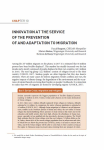Bergeret P., Stuiver M., Rooij B. de. (2019). Innovation at the service of the prevention of and adaptation to migration. In : Plaza P. (dir.), Melonio T. (dir.), AFD (Paris, France), CIHEAM (Paris, France). Mediterra 2018 : Migration and inclusive rural development in the Mediterranean.
Paris (France) : Presses de Sciences Po.
p. 211-229.
(Mediterra).
Chapter 10.
https://www.ciheam.org/uploads/attachments/208/chapter_10.pdf
https://www.ciheam.org/uploads/attachments/208/chapter_10.pdf
| Titre : | Innovation at the service of the prevention of and adaptation to migration |
| in : | |
| Auteurs : | P. Bergeret ; M. Stuiver ; B. de Rooij |
| Type de document : | Chapitre d'ouvrage |
| Editeur : | Paris [France] : Presses de Sciences Po, 2019 |
| Collection : | Mediterra, ISSN 1960-8527 |
| Format : | p. 211-229 |
| Note générale : | Chapter 10 |
| Langues : | Anglais |
| Catégories : |
Catégories principales 13 - QUESTION SOCIALES ; 13.2 - Migrations InternationalesThésaurus IAMM MIGRATION ; MIGRATION INTERNATIONALE ; TECHNOLOGIE DE L'INFORMATION ET DE LA COMMUNICATION ; INNOVATION ; ADAPTATION ; ADAPTATION AU CHANGEMENT ; PREVENTION ; POLITIQUE MIGRATOIRE ; REGION MEDITERRANEENNE ; MOYEN ORIENT ; MIGRATION CLIMATIQUE |
| Résumé : | Among the 257 million migrants on the planet, in 2017 it is estimated that 66 million persons have been forcibly displaced1. This number has steadily increased over the last decade and is mostly composed of people displaced in their own countries (40.3 million in 2016). The next big group (22.5 million) consists of refugees forced to flee their country (UNHCR, 2017). Stateless people are often forgotten but they also deserve attention. There are many causes for distress migration: besides conflicts and wars, the negative impacts of climate change, the degradation of the environment and the occurrence of natural hazards are laying their burden on peoples’ livelihoods. It is important to realise that 84% of migrants are hosted by developing regions (UNHCR, 2017). There is a need for international, regional and local governments to re-think policies, programmes, spatial and social planning. The UN pleas for a clear focus on facilitating safe, orderly and regular migration, enabling beneficial impact of migration for migrants and countries, for communities of destination and of origin (UN, 2017). To reach this objective, inclusive and comprehensive strategies are of utmost importance. The primary challenge for governments in the development of such inclusive and comprehensive strategies is to gain full understanding of the different forms of mobility, the complexity of interlinkages and spatial dispersion. These comprehensive strategies consist of innovative social and technical interventions and new modes of governance in response to the challenges and the specific context. |
| Cote : | BM-I02-PLA-2019 |
| URL / DOI : | https://www.ciheam.org/uploads/attachments/208/chapter_10.pdf |
Documents numériques (1)
PRo39691.pdf Adobe Acrobat PDF |







